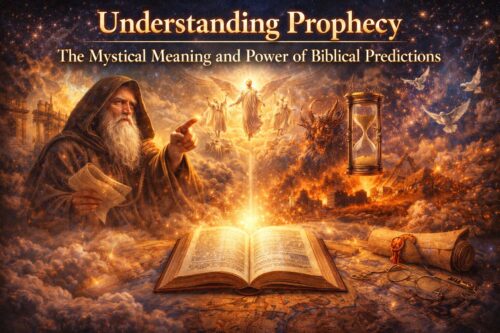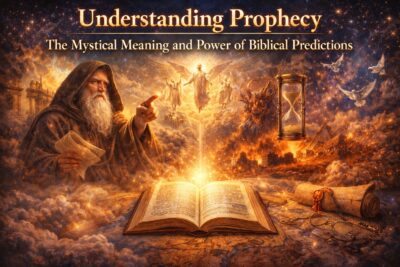Prophecy and Premonition: Exploring the Mysterious Power of Prediction and Our Role in Shaping the Future
Introduction: For as long as humans have existed, we have been fascinated by the unknown and the desire to peer into what lies ahead. From ancient oracles to modern-day psychics, the concept of prophecy has been a constant presence in cultures and societies around the globe. But what is prophecy truly? Is it a supernatural ability to see a fixed future, a divine message, or a deeper connection to a realm of infinite possibilities? This article delves into the captivating world of prophecy, exploring its historical significance, the scientific and psychological debates surrounding its accuracy, and the profound questions it raises about fate, free will, and our capacity to shape our own destinies. Join us as we journey into the heart of this ancient mystery, seeking to understand the power of prediction and our role in the ever-unfolding story of the future.
1. The History and Mysticism of Prophecy: From Oracles to Modern-Day Seers
The practice of prophecy is deeply embedded in human history, serving as a source of guidance, comfort, and sometimes, fear. It’s a phenomenon that has transcended time, culture, and religion, evolving from mystical rituals into a topic of modern-day intrigue.
- Ancient Roots and Divine Guidance: In the ancient world, prophecies were often seen as direct communications from the gods. The Oracle of Delphi in Greece, for example, was one of the most respected prophetic institutions, sought out by kings and commoners alike for its cryptic but influential predictions. These prophecies were not meant to be straightforward facts but rather symbolic messages that required careful interpretation. They provided people with a framework to understand their world and a sense of divine order. This mystical understanding of prophecy continues to influence many spiritual and religious traditions today, where prophets are revered as messengers of a higher power.
- The Paradox of Unpredictability: While many people believe in the power of prophecy, the very nature of prediction is shrouded in uncertainty. Even scientific forecasts, like weather predictions, are not always 100% accurate because they are based on complex and ever-changing variables. This inherent unpredictability raises a key question: if the future is a dynamic system, how can it be predicted with absolute certainty? This mystery is a core reason why prophecy remains a topic of both wonder and skepticism.
- The Psychological Element: The human mind has a remarkable ability to find patterns and meaning, even in random events. Psychologists argue that what we perceive as a prophecy coming true could be a confirmation bias, where we only remember the successful predictions and forget the countless failures. This selective memory, combined with vague or symbolic language, can create a powerful illusion of accuracy. This doesn’t necessarily disprove prophecy, but it does highlight the importance of approaching it with a healthy and critical perspective.
2. The Connection Between Prophecy and Premonition: Exploring the Mind’s Intuitive Power
While prophecy often refers to large-scale, world-changing events, a more personal form of prediction exists in the form of premonition. This is the intuitive feeling or knowledge of a future event, a phenomenon many people claim to have experienced in their own lives.
- Premonitions and the Subconscious Mind: Many scientists and researchers of consciousness believe that premonitions could be a manifestation of the subconscious mind picking up on subtle cues that our conscious mind misses. For example, a “gut feeling” about a certain situation might be your brain processing a series of small, unnoticeable details and formulating a subconscious conclusion about a potential outcome. This doesn’t mean it’s supernatural, but it does show that our brains are far more powerful than we often realize.
- The Power of Dreams: Dream prophecy is another fascinating aspect of premonition. Many individuals report having prophetic dreams that accurately foretell events, from small, personal occurrences to major global happenings. While these are not scientifically proven, they do suggest a potential link between our dream state, our intuition, and the flow of information in the universe. Some spiritual and psychological theories suggest that in the dream state, our minds are less constrained by the limitations of time and space, allowing for a broader awareness.
- The Self-Fulfilling Prophecy: A compelling psychological concept that relates to prediction is the self-fulfilling prophecy. This is a phenomenon where a person’s belief in a prediction causes them to unconsciously behave in a way that makes it come true. For example, if you believe you are going to fail an exam, you may become so anxious that you don’t study effectively, thus causing you to fail. This demonstrates that the power of prophecy is not always in its accuracy, but in the belief we place in it.
3. Divination and Its Tools: Tarot Cards, Astrology, and the Search for Meaning
Prophecy is closely linked to divination, the practice of seeking knowledge of the future through various methods and tools. These practices, such as tarot cards and astrology, are not just about prediction; they are seen by many as a way to gain self-awareness and spiritual guidance.
- Tarot Cards as a Map of Consciousness: Many people who use tarot cards do not see them as a way to predict a fixed future. Instead, they view the cards as a mirror of the subconscious mind, a tool that helps them understand their current emotional state, their challenges, and their potential. The symbols and archetypes on the cards provide a framework for self-reflection and can help a person make more informed decisions about their life. In this sense, tarot is less about predicting what will happen and more about understanding the energies at play so you can navigate your path with greater awareness.
- Astrology and the Study of Cosmic Patterns: Astrology is an ancient form of divination that studies the positions of celestial bodies to understand their potential influence on human events. While it is not a scientifically proven practice, for centuries, people have used it as a tool for self-discovery and for gaining insight into personality traits, relationship dynamics, and life cycles. It is seen as a way of understanding the “cosmic blueprint” of a person, offering a sense of order and purpose in a chaotic world.
- Prediction as a Guide, Not a Decree: Whether through a psychic reading or a tarot session, the best approach to prophecy is to see it as a guide, not as a rigid decree. A prediction should empower you to make better choices and take more control of your life. If a prediction tells you a certain event will happen, you can use that information to prepare for it, to change your path, or to use the knowledge to your advantage. This is the ultimate paradox of prophecy: it doesn’t just foretell the future, it has the power to change it.
4. Conclusion: Prophecy, Free Will, and the Infinite Adventure of the Future

In the end, prophecy remains a fascinating and mysterious topic. While its scientific validation remains elusive, its power to influence human lives is undeniable. The most profound lesson we can take from prophecy is not about foreseeing the future, but about understanding our own role in creating it. Whether prophecies are divine messages, intuitive insights, or self-fulfilling beliefs, they all point to a fundamental truth: the future is not a predetermined path. It is a dynamic canvas, full of infinite possibilities, and we are the artists who hold the brush. The adventure of life is not in knowing what lies ahead, but in embracing the excitement of the unknown and trusting in our power to shape a future filled with wonder, purpose, and endless possibilities.
